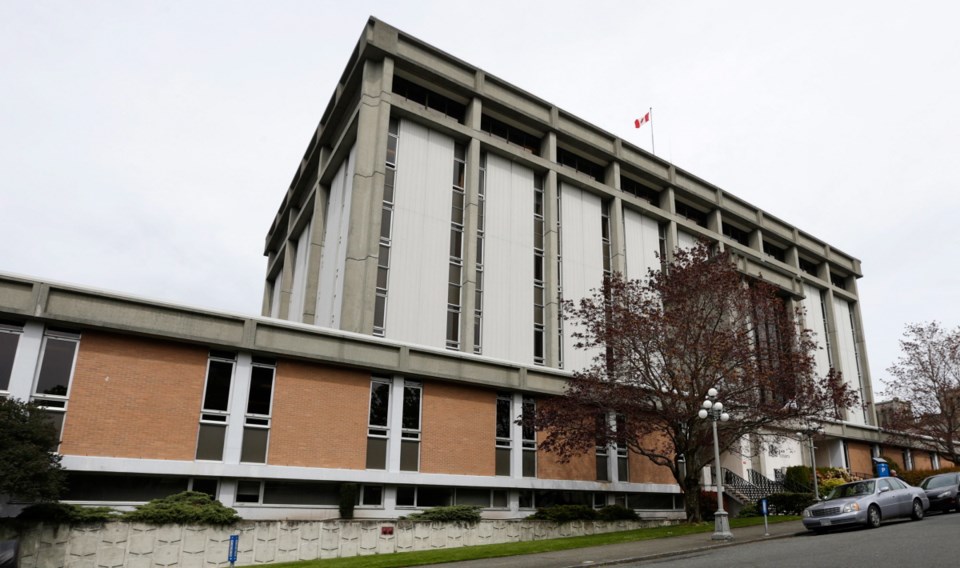A homeless man trespassing in a Fort Street doorway was within his rights to walk away and resist arrest by two Victoria police officers who wanted to serve him with a violation ticket, a provincial court judge has ruled.
John Chambers was charged with obstructing a police officer on Feb. 11, 2017. Chambers was also charged with assaulting the arresting officer by spitting on him.
“Were the police engaged in the lawful execution of their duties when they demanded Mr. Chambers remain on the scene until he be served with a violation ticket for trespassing?” asked Judge Christine Lowe, as she outlined the legal issues raised by the case two weeks ago. “And further, were they entitled to regard his non-compliance as obstruction, justifying their arrest of him?”
At trial, Chambers admitted he was trespassing, Lowe said. He was in his sleeping bag in the alcove of 780 Fort St. with his belongings strewn about him on a Saturday afternoon.
A sign prohibiting camping, loitering, trespassing and soliciting was clearly visible on the door.
Two officers arrived and told Chambers he had to pack up and move. Chambers was asked for his name and date of birth. Because the officers assumed he was homeless, he was not asked to provide his address. His identification checked out, Lowe said.
Chambers was moving very slowly packing up his things. He had become agitated and confrontational. One of the officers told Chambers he was not free to leave because he would now be issued a violation ticket.
The officer went to his car to write it up, but became concerned when Chambers became more agitated. The other officer remained with Chambers and repeatedly told him he was not free to leave because he was getting a ticket, Lowe said.
But Chambers started walking east on Fort Street. The police officer followed, telling him he couldn’t leave and warned him he would be arrested for obstruction, said Lowe.
Chambers pointed at him and said: “I can walk away.” By this time he was yelling, red in the face and swearing.
The second officer, concerned for his partner’s safety, got out of the police car and told Chambers he was under arrest. Chambers was placed in handcuffs.
He took a deep breath and spat at the police officer. He was taken to the ground. The officer who was spat on hit Chambers with a closed fist to the side of the head. Both officers subdued Chambers with knee strikes.
Crown prosecutor Kate Dutton argued that the officers were acting lawfully when they told Chambers he was not free to leave until they served him with the ticket.
Defence lawyer Chantelle Sutton argued that police do not have the statutory or common-law power to detain someone just to give them a violation ticket. The Trespass Act targets vulnerable people in the community and they have the same rights as others not to be arbitrarily detained or unlawfully arrested, she said.
The police could have arrested Chambers for trespassing but they didn’t, noted Lowe. He was arrested only because he failed to remain to have the ticket served on him.
They could have served Chambers with the violation ticket at a later date or brought the matter before the court.
“Although a police officer has the general duty to enforce the bylaws and laws of the province, the fact remains that although they may serve a ticket immediately after the contravention, it is not necessary that they do so. I find, therefore, that in circumstances of this case, the interference of the accused’s liberty was not necessary for the carrying out of the police duty,” Lowe said.
The judge said it was regrettable that the underlying circumstances of the offence — a homeless man trespassing and facing a $115 fine — turned into a physical altercation between police and the accused.
It was clear both officers believed they had the authority to detain Chambers until he was served with the ticket, Lowe said. It was also clear that Chambers believed he was required to move but that he was not required to remain there.
“I concluded that in these circumstances, the police who had not arrested Mr. Chambers for trespassing, did not have the legal authority to force him to remain at the scene to be served with a ticket,” Lowe said.
“Their attempt to arrest him for obstruction was, therefore, unlawful and he was entitled to resist his arrest as long as his actions were reasonable. … I find that his actions were reasonable in repelling his unlawful arrest, save and except his attempt to spit on the officer.”
Chambers was acquitted of obstruction. He was convicted of assaulting the officer and sentenced to seven days in custody.



